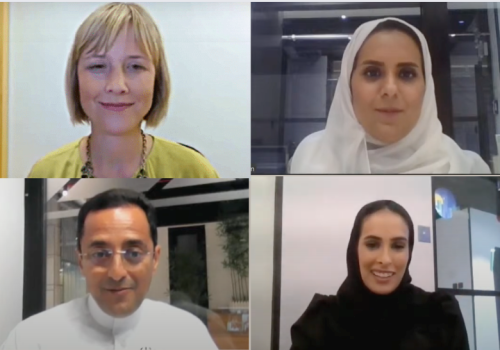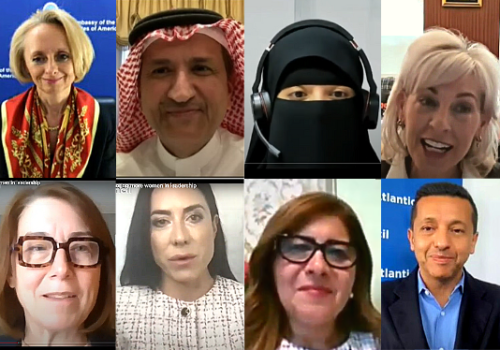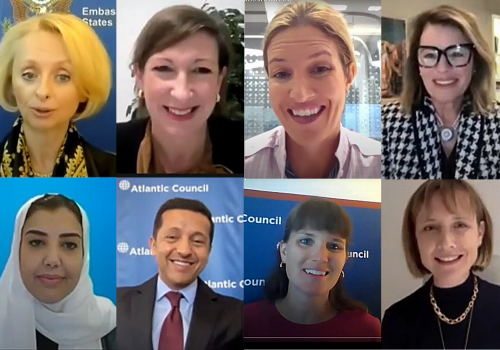Societal norms in Saudi Arabia clearing the way for more women to start and lead businesses
On December 5, 2022 the Atlantic Council’s empowerME Initiative held a panel event on the impact of societal norms and structures on women’s economic empowerment in Saudi Arabia. The discussion was moderated by the American and Chamber of Commerce Saudi Arabia Women in Business Committee Co-Chair Jamila El-Dajani. It featured Foodics Head of Talent Acquisition Bara’a Al-Khateeb, King Faisal Center for Research and Islamic Studies Research Fellow Hanaa Almoaibed, The Arab Institute for Women’s Economic Empowerment – Nusf Founder & CEO Mae Saleh Almozaini, and PwC Middle East Inclusion & Diversity Director Zina Janabi.
This was the third in a series of four events for the first cohort of the WIn (Women Innovators) Fellowship launched in Saudi Arabia. The fellowship is led by the Atlantic Council’s empowerME Initiative in cooperation with Georgetown University’s McDonough School of Business with support from US Embassy Riyadh, PepsiCo, and UPS. The American Chamber of Commerce Saudi Arabia’s Women in Business Committee is the program’s in-person event partner. The yearlong program from March 2022 – March 2023 enables over thirty Saudi women entrepreneurs to enhance their networks, gain practical knowledge, and develop US-Saudi people-to-people and business ties that will help them scale their business locally, regionally, and globally.
The key points from the discussion are summarized below.
Major changes in Saudi Arabia impacting women in recent years:
- Jamila El-Dajani highlighted the changes in Saudi Arabia that allowed women to gain freedom and independence while providing new opportunities for them in terms of employment, entrepreneurship, and business leadership. She shared one example: “The kingdom just announced seven hundred new licenses for women lawyers, bringing the total to 2,000, which is a rapid shift from a decade ago.”
- Mae Saleh Almozaini highlighted women’s freedom of mobility since they’ve been permitted to drive. She noted that women’s participation in the workforce in Saudi Arabia increased from “17 percent to 36 percent,” underscoring their increased ability to make contributions to the economy over the past five years.
Areas where change to support women’s inclusion in workplaces is needed:
- Zina Janabi emphasized the necessity of transformational change at organizational and individual levels for women in the workplace. She highlighted the dual approach that some organizations are using to create a culture where women can thrive while providing policies and programs that allow them to move up the workforce ladder. Furthermore, Janabi explained on a personal level that it’s essential for women or any minority to support one another when experiencing barriers in their careers.
- Bara’a Al-Khateeb said, “I don’t think what women face in terms of challenges in KSA [Saudi Arabia] is far different than what women face globally.” She added that women worldwide sometimes encounter unhelpful stereotypes. She noted that studies show that when companies promote employees to a leadership position, women are considered 15 percent less than men for these promotions due to stereotypes. Al-Khateeb contended that women have underrated social intelligence, which is a vital skill for leaders. She added that women are also often paid up to 35 percent less than males.
- Hanaa Almoaibed highlighted that the dual burden for working mothers increased due to the pandemic’s various challenges while stating that Arab societies lack a culture of professional childcare, such as nannies. She stressed the need for women to create “better care facilities” that will provide a vital support system for working mothers.
- Al-Khateeb stressed the lack of opportunities for leadership, mentorship, and coaching for women. She added that women wish to pursue leadership roles; however, these challenges and the cultural barriers can make women’s full participation or rise to a leadership role much more difficult.
- Almoaibed stressed the need to train teachers to help students with practical 21st-century skills in schools and essentialize extracurricular activity. She suggested institutionalizing structured career guidance in schools for every student in the kingdom from an early age to build proper research and negotiation skills that will link with “realistic job training” for them in the future.
- Almozaini addressed a major concern in Arab societies: raising women to be shy and reserved, which can affect their confidence in the future. Women need to become more assertive and outspoken, Mae emphasized, adding the importance of providing a mentorship program for women to be guided throughout their career path.
- Al-Khateeb highlighted that while adding female workers rewards companies with the flexibility of hiring employees from various nationalities, women’s presence has positively impacted dollar value and increased team collaboration. She encouraged people to raise awareness of women’s effectiveness in leadership roles and business.
Opportunities for women entrepreneurs and startups in Saudi Arabia:
- Almoaibed explained that more and more people in Saudi Arabia are starting companies; however, she pointed out that “risk is still the most significant barrier to going into an entrepreneurial adventure” and “seventy percent of people who consider forming a private business back out because they fear the project’s failure.”
- Al-Khateeb emphasized the importance of flexibility to women; she noted that startup companies sometimes have more agility and willingness to do this. She stressed that providing employees with flexibility will help more women take on leadership roles. She shared her personal story, explaining that during her hiring interview at Foodics, the male interviewers asked what would make the role more attractive for her, and she requested to work remotely because she was pregnant with her third child. She wasn’t expecting them to agree, but they told her she would be Foodics’ first remote employee. Their willingness to provide flexibility had a significant impact on her as a working mother.
- Al-Khateeb also shared her insight as a recruiter, highlighting that women are applying to a wide range of positions in Saudi Arabia, despite the challenges that come with these roles such as traveling requirements or working long hours.
- Almozaini highlighted that the G20, which was hosted in Saudi Arabia two years ago, reported that investing in targeted training for Saudi women will generate $400 billion in return on investments to the country’s GDP by 2030. Therefore, promoting women’s inclusion in the workforce is a business necessity, not just a moral imperative.
Nour Alhajjeh is a Young Global Professional with the Atlantic Council’s Rafik Hariri Center for the Middle East & Middle East Programs.
Further reading
Mon, Oct 3, 2022
New laws in Saudi Arabia support women in business, and society is catching up quickly
Event Recap By
On September 28, the Atlantic Council’s empowerME initiative held a discussion on regulations and laws that impact women in business in Saudi Arabia.
Tue, Jun 14, 2022
Promoting more women in leadership is “a business imperative” and key to unlocking economic prosperity, say top executives
Event Recap By Allison Holle
On June 7, the Atlantic Council’s empowerME Initiative held a workshop on "Balance of power: Promoting more women in leadership."
Mon, Nov 8, 2021
Top women execs on leading “deliberate” organizational change, fostering diversity and inclusion, and coping with challenges
Event Recap By Stefanie Hausheer Ali
On November 2, the Atlantic Council’s empowerME Initiative held a workshop on “Women in senior management: Masterclass in leadership.”


